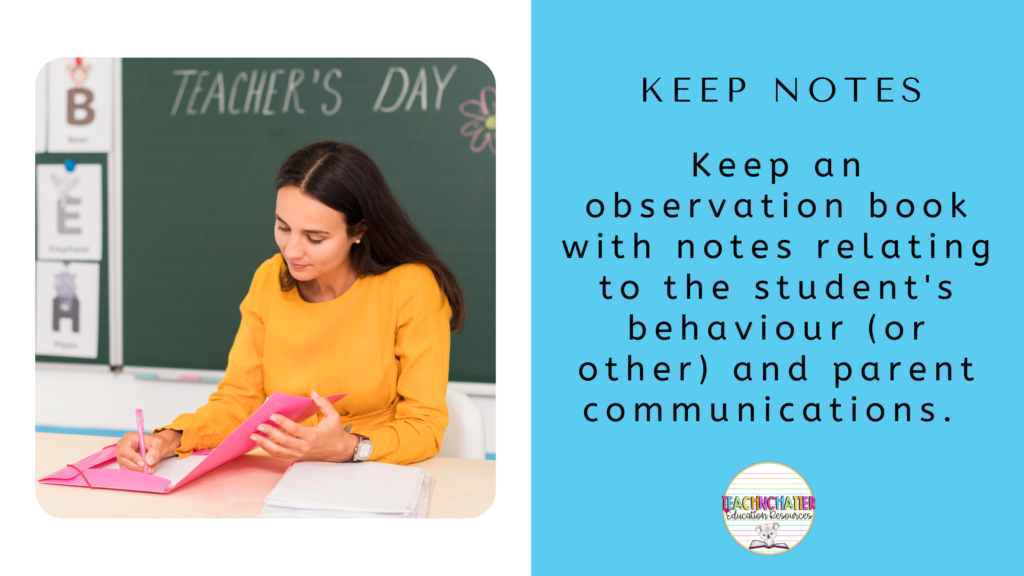Dealing with difficult parents
This is such a complex subject. I will do my best to come at it from a variety of angles to serve you best. I have the luxury of being able to see both sides. I am both a parent and a teacher, like many teachers out there.
Background reasons for why this is a difficult subject…
1 – The word ‘difficult’ may be subjective. What I perceive as difficult may not be difficult to you. It’s that simple. Why? Because we all have different perceptions, communication styles and past experiences to lead us into this state. For example, if you (as a teacher) have the perception that parents should always be extremely polite, you may be constantly disappointed when this does not happen. If you expect that parents always be honest and open, you may be disappointed. So, in a nutshell, your expectations for how others should conduct themselves in all forms of communication is going to either meet your expectations or not. Furthermore, how you deal with the letdown is going to impact your wellbeing.
2 – Your current state of emotional wellbeing is going to affect what you perceive as ‘difficult.’ For example, if you are experiencing trauma yourself, suffering from a mental health illness or just really run down, you are potentially going to perceive minor issues as ‘difficult.’ It is like your “tolerance” level is really low!
3 – Past experiences – your past experiences (including trauma and stress) may be the cause of any over reactions in difficult situations. As I mentioned in point 2, your tolerance level is going to be low if you have continually faced difficult situations and conflicts with parents (unless this is water off a ducks back for you!).
4 – New experiences, new parents and new situations. You may be a really experienced teacher but you are now dealing with different situations, different cohorts of students, differing parental styles and so forth. So, how you “dealt” with perceived difficult parent situations in the past may not be relevant today at all.
5 – Cultural expectations may be different and complex. As our world becomes increasingly multicultural, we need to consider that peoples own culture, religion and belief system will potentially impact the way that the person interacts with the general public (you being the ‘public’). It may be acceptable to shake hands in some cultures and not in others. Stating a negative test score to a parent may be taken as a massive form of failure to them as a parent and not just their child’s score.
6 – Rational to you or them? What may seem like a “rational” way to handle a situation perceived as being difficult will vary according to the person, their knowledge and their life experiences.
So, let’s move on. For the sake of this blog article, I will outline what I perceive as “difficult.”
A parent may be verbally abusive, passive aggressive, twist words, lie, physically threatening (or worse, physical), “stalkerish”, unrelenting and over the top for everyday questions and situations and finally, daily confrontations of minor situations (whether in person, phone calls or emails). There are some differences in the degrees of aggressive behaviours here. They all surmise to being difficult.
Have you experienced any of these situations? I’d think it would be unlikely if you hadn’t experienced even a sniff of the above.
So, what can you do? Here is the tricky part…
Firstly, I will briefly discuss some protective steps to take at the beginning of the year to avoid the occurrence of dealing with potentially difficult parents.
1 – Hold a parent meeting at the beginning of the year – invite an admin member if required (e.g. if you know ahead of time that there may be difficult parents). Clearly outline what your goals are for the year, how to communicate with the school and yourself and how you establish behaviour expectations in your class. If parents know that nothing is hidden, you are upfront and clear, they may be less likely to have issues.
2 – Communicate regularly with parents – this is more important if you have students with learning disabilities, special needs and behavioural/learning concerns. No parent wants to hear one week prior to receiving a report that their child is failing a subject. You may have a weekly newsletter, online app for communications or a noticeboard. Some parents like to be involved. I usually try to vary my communications (especially for important events) to include written, online and noticeboard. A phone call may be required when the subject is important and you do not have time to schedule a meeting. Let parents know the good things that happen in your class on a regular basis!
Now, how can you manage difficult situations and parents?
Tips for teachers dealing with difficult parents
1 – Speak in very clear terms. Do not use teacher phrases that you know and the parent may not know. NO matter how well educated the parents in your district may be, they are not four (or six) year trained teachers like yourself. This will mean that they do not know the education terms that you use. Just use everyday language.
2 – Do not assume anything. Do not assume that your parent understands everything you say. Keep in mind that the parent may have a communication or language disorder. Write notes down if required. Repeat the message and use everyday language as suggested above.
3 – Keep communications to school hours only. I know this is hard. I find this difficult too, especially when you do not have time to respond within work hours (because you are teaching) and then get home to care for your own family! I try to keep it to the next day or in the least, title the email with: Message for Monday 8am. This is not ideal. DO NOT CHECK YOUR EMAILS when you are not at work. Close your email account and do not open it until your return to work.
4 – Organise a meeting. If small communications or emails are getting aggressive or too frequent, there may be a deeper issue. Organise a meeting. Ask admin to set this up or be present. What can you do if your admin team will not organise a meeting or sit in? Ask a highly professional and trusted colleague to sit in the meeting with you or simply work from a desk in the same room so that they can be present as a witness if required. Please note; if a parent is physically aggressive, you must not have a meeting by yourself and will have to wait for admin to be present.
5 – Begin all communication on a positive note. Say, or write, what is happening that is positive to begin with. No matter how small, find something positive and comment on this first. For example, I appreciate the way you are being so open with me, or, Johnny has beautiful manners.
6 – Try to put yourself in the parents shoes. How would you feel and respond in the present situation?
7 – Write brief dot point notes down prior to the meeting and refer to them if you need to. Avoid rambling on. Everyone gets confused and the reason for meeting may flow on to other less important areas and your meeting may even turn heated. Stay on track. Be focused. Why are you meeting? What are you wanting from this meeting? Keep it short and on track. Hint: you may be dealing with a parent who has ADHD themselves, be the one who keeps the meeting on track to help both of you.
8 – Ask the parent questions and allow the parent to ask questions. If you cannot answer the question… don’t. Simply say, I cannot answer that question right now. I need time to think about this and I will get back to you. I find honestly is always the best policy. You don’t know what you don’t know.
9 – Begin the meeting by thanking the parent for coming and give an outline for the meeting. I always begin by saying that I will provide some feedback or observations briefly at the beginning and then allow the parent some time to give feedback and ask questions. This can be useful for many reasons but mainly, the parent may not actually know all of the facts and when they hear you say them, it may immediately disarm them! Also, if the parent knows that they are going to get the opportunity to talk, they can relax while you are talking and not interrupt.
10 – Stop the meeting at the right time. If you need to schedule a meeting for later on (when more information has been collected) then do so. Avoid going round in circles. Thank them again for coming in. Agree on whom is doing what prior to the next meeting.
11 – Maintain a positive tone and body language during the meeting. It may be hard but just be professional. You do not have to be an entertainer. You just have to be civil, polite and professional.
12 – Provide a copy of the meeting minutes to the parent and your admin team (plus your own teacher files) for confirmation that the meeting occurred and what the follow up actions will be. No one can then dispute it. Parents are requested to sign this form. Save email communications if this is how you communicate with parents. If you are having a phone conversation, dot point key discussion points.
13 – Take a breath. Yes, literally. Breathe and slow down before you have important discussions.
14 – Discuss your concerns with your admin team. If your admin team are supportive, this is fabulous. If they are not supportive, still discuss what the issues are, note that you have discussed the issues and seek external advice.
15 – Keep an observation book. This has never been more important. Write down who is saying and doing what when and how. You may forget really important details and being informed is going to be important to look out for your own rights.
Questions?
1 – What do you do if a parent is verbally aggressive (e.g. shouting, swearing and abusive) or physically aggressive? State in a calm manner that you will not conduct the meeting in these conditions. Ask them to leave and come back when they are ready. Walk out. It is not safe or necessary for you to subject yourself to this at any time. Remember, how you respond (even in an awful situation) says a lot about you too. Stay professional and remove yourself from the situation. The parent needs to know that such behaviour will not be tolerated.
2 – What do you do if a parent is flat out lying? Calming state that this has not occurred, you have no evidence of this happening, you can look into this and so forth. Document what is said. If it is completely negative and false, reschedule. Keep it shorter. State, I have documented your statements. I have also documented that I disagree with your statement. I will look into xyz. Discuss this with admin if they were not present at the meeting.
3 – How do you deal with a parent who is making false claims via email or social media? This is technically slanderous, though in some situations, the parent may believe it is true and be seeking clarification. Answer the statement as honestly as you can. If it is false, state that and save the email. Do not answer any comments via social media. It is not recommended that parents and teachers engage via social media (e.g. twitter, facebook, snapchat).
4 – What do I do if my admin team are not supporting me? Reach out to your union to see what your rights as an educator are. Reach out to trusted colleagues. Get some critical feedback first. Is there something you are doing to unknowingly make this situation worse? If not, talking to trusted (and professional) colleagues is important for your own mental health and wellbeing.
5 – What if I’ve tried everything and nothing works? I don’t like to say it but this can happen. Why? Because you cannot always control other peoples reactions, feelings and emotions (even if you are doing all of the “right” things). People have their own baggage. Some people are just not going to like you, right or wrong. All you can control is how you deal with the situation. Do the right thing by being open and honest. Be professional, polite and follow up on things. Be open to solving problems. That is all you can do.
Finally, if you are dealing with a difficult parent, it can be very tiring. You will need to do all of the above steps. These are steps that certainly not discussed in my university days and lectures. These are tips that I have learnt over the years.
Once you’ve ploughed through all of the above steps, look after yourself. Take some small self-care steps.
1 – Do something for yourself – I find having a bath and walking on the beach work wonders for my soul.
2 – Talk about it – Talk to a trusted friend but do not mention names or any confidential concerns/issues with your friend.
3 – Engage the services of a professional. If none of these steps are helping you, seek psychological support. Most school districts or unions will provide counselling of some sort. Also, know that you are not alone.
4 – Look for humour – Watch a funny Netflix (no, I’m not an affiliate, ha ha) show and laugh. There are some funny Instagram pages that I follow for a laugh too. Noodles the dog is one.
After it has all happened and hopefully, been resolved. Take some time out to reflect. Write in a journal. How would you respond next time? Are there steps that you would take to improve the outcome? Do you need to act on things quicker (or not so quick)? Are you responding in a calm manner when dealing with parents? In a nutshell… is there anything you are doing to inadvertently hurt yourself in these situations? Do you need to up skill yourself in your own communication skills? I say this without blame. I do not know who is reading this article and my only aim here is to help! I always critique myself on every situation I come across and think of ways I could do better in each situation. Do not do this in a blaming way. Be kind to yourself. You may even like to approach your own self-improvement like we do with our students… three stars and one wish. So, it could go like this… I always listen, I clarify and I am friendly but I need to communicate concerns to parents earlier. That simple. So, I do not mean rip yourself to shreds at all. That is not going to help! You may be doing everything right and it is hurting you. You may like to try one of the latest apps out there for mental health too. Smiling Mind is one but there are many more. You may also wish to discuss your wellbeing with your GP.
Most teachers are going to face difficult or unhappy parents at some stage of their career. This is a hard pill to swallow. Just being a wonderful teacher and nice person does not mean that you will have no issues. I’m sorry to say this truth. You will be disappointed if you think this only happens to people who have done the wrong thing. You are not alone. I’m sorry if you are experiencing a difficult situation. Generally, we teachers tend to put our whole body and spirit into our job. Being a care based industry we have the best intentions.
Another thing to remember is that difficult times do not usually go on forever. They come and go. See the links below.
I wish you all the best,
Take care too.
Kind regards, Jennifer
Handy links:
state school teachers union wa:
state school teacher union western australia
union for independent schools:
psychology services for teachers:
Further reading:














